- Home
- Neal Stephenson
The Mongoliad: Book Two Page 25
The Mongoliad: Book Two Read online
Page 25
Feronantus had little choice but to play the role of the dignified leader and see this through as if he had expected it all along.
All unaware of this prickly dynamic, Percival continued. “I assumed, at first, that this benison would be some sort of holy relic. And when Vera told us of the tunnels and catacombs below the city, filled with treasures, I naturally assumed that what I sought would be found there. Instead, we uncovered nothing but a few odds and ends, and I lost my best friend in battle.”
Percival’s face darkened—literally. The effulgence took on a grayish hue, which Raphael observed with both alarm and deep curiosity. He threw a glance at Benjamin, who had cocked his head to one side, mouth open a little, eyes searching. Their gazes met. Raphael gave the merest shrug.
“In the weeks since,” Percival said, “I have prayed and meditated upon these events, imploring God to send me understanding. This morning, God answered my prayers. The object of our quest to Kiev was not some artifact but the Shield-Maidens themselves. Vera’s return to our group is confirmation of God’s will. She was destined all along to join us and ride with us into the East.”
Benjamin seemed embarrassed. “You have too many quests for me to keep track of,” he muttered.
Percival shook his head forbearingly. “For us, there is only one,” he said.
“The one that takes you into the East, following the caravan trails?”
“The same.”
“And what, pray tell, might be the object of that quest?”
“Don’t!” Feronantus sat forward and stretched out an arm toward Percival. But it was too late.
“We will ride into the heartland of the Mongols’ empire. We will find the Great Khan, and we will slay him.”
Feronantus burst out with a long oath in his native Gothic, not at all becoming of a monk. Raphael was able to make out the names of at least two pagan gods.
The little meeting had become a Tower of Babel. Benjamin spoke to the nonplussed rabbi in Khazar Turkic, presumably translating Percival’s words, and they went on to conduct an agonizingly long discussion in that tongue, perfectly opaque to Raphael.
Finally, as Feronantus buried his head in his hands and sank back in gloom, Benjamin looked at Raphael. His cloudy scowl faded, he lifted his shoulders, held out his hands—and smiled.
“Why not just tell us that in the first place? I cannot speak on behalf of my cousins who dwell in this little village, of course. But as far as I’m concerned, anyone as determined as you seem to be to kill the Great Khan, and throw his empire into disarray, is brethren to us all in this terrible time foretold by the Nevi’im, and there is almost nothing I won’t do to help further your quest.”
The rabbi ran his fingers through his beard, as was his habit when deep in thought.
“I felt confident you’d see it that way,” Percival said, breaking into an amazed silence.
“This all came to you in a vision?” Benjamin asked.
Percival looked up and smiled. The light on his face was again apparent. Raphael was almost certain the others saw it as well. There were so many reasons for living, breathing, sinful men to feel uncomfortable around Percival.
“You are indeed a holy fool,” said Benjamin, “for I am a strange man, and not one merchant in a thousand would respond as I have.” Benjamin now turned to address Raphael in Hebrew. “Please say to the others that I commend you all for your bravery and wish you the best of luck on your quest. But we who must remain here are in grave danger. We can only assume that the Mongols will search tirelessly for the surviving Shield-Maidens.” Raphael quickly translated.
Feronantus’s response was immediate and simple. “We will draw them away from you,” he said, “and destroy them.”
21
Quod Debuimus Facere, Fecimus
“WHY DID YOU let him go, you idiot?” Fieschi snarled, whirling away from de Segni in frustration. “He was right there, he was standing next to you, you were befriending him...and then what? I looked away for one moment, and suddenly, Robert of Somercotes is practically embracing him!”
Fieschi seldom lost his temper; when he did, months of controlled, pent-up anger erupted from him at once. And in this moment, when he could not raise his voice as he wanted to, the fury came hissing out of him like scalding steam. Rinaldo Conti de Segni winced. Although they were standing in his bedchamber, it was clear he wanted to flee; Fieschi owned the space entirely with his wrath. “At least I made an opening gambit,” de Segni said, trying to look disdainful rather than chastened. “I approached him. You have not done that much. Consider that before you accuse me of not taking sufficient action.”
Fieschi made a disgusted sound and turned back toward de Segni. “I approached him when he was delirious. I took his satchel from him. What little we know about the man we know because of me. If I had walked across the courtyard to get close to him today, it would have been obvious, even to him, that I was up to something. Somercotes and I would have gotten into a veritable tug-of-war and torn his arms off. Whereas you had managed to approach him as if in innocent greeting, welcoming him to our special little hell, offering assistance and introduction. And then you handed him over to the enemy!” He shook his head. “I can’t believe I ever considered putting you forward as a candidate.”
De Segni stiffened. “I would have made a better choice than your precious Bonaventura.”
Fieschi’s nostrils flared, and the whites of his eyes flashed in the torchlight. “I swear, if you waver in your support of Bonaventura, you will find a scorpion in your bed.”
De Segni held up his hands as if warding off a blow. “Of course he’ll get my vote, Fieschi. That doesn’t mean I approve of him.” More bitterly, and softer, he added, “At least it isn’t you I have to vote for.”
Fieschi’s face, which had been florid with anger until that moment, was suddenly unreadable. Incompetency distressed him; insults did not touch him. “You have just demonstrated why you would have made a poor candidate for Pontiff,” he said, almost triumphantly. “It takes a selfish, petty man to choose a Bishop of Rome according to the candidate’s personality. There are important issues at stake, and we cannot afford to indulge our egos or our personal preferences. I am not fond of Bonaventura myself—”
“You’re not fond of anyone, Fieschi,” de Segni interrupted, in full control of his disdain now, “except yourself.”
Fieschi shook his head slightly, slowly. “This is precisely the petty bickering that Frederick’s men want us to devolve to. Rise above it, Rinaldo. Now.”
He turned on his heel and stalked out of de Segni’s room.
As much as he despised Robert of Somercotes, he respected him, as an able enemy ought to be respected. Somercotes had snatched a quick and easy victory away from Bonaventura; the Englishman had quickly mustered the necessary voices to put Castiglione forward as a challenging candidate, and now the two factions were deadlocked. It enraged Fieschi that so many cardinals would consider voting for a man whose will would bend not to the Church but to the Holy Roman Emperor—somehow Somercotes had intellectually seduced them into it. One candidate or the other would need a two-thirds majority to become the next leader of the Catholic Church. That meant eight votes, now that this mysterious priest brought their number to an even dozen. The new arrival was the fulcrum upon which to rest the necessary lever to pry loose the undecided cardinals. But damned Robert of Somercotes knew that as well and had clung to the priest like a leech, seldom out of his company and never out of his sight.
* * *
“I heard you cry out in your sleep,” Somercotes said gently, sliding the damp cloth from Rodrigo’s forehead to the back of his neck. “I have some knowledge of physics, but the guards will not allow my medicines to be brought in. Fieschi is afraid I will drug my fellow cardinals to bring them under my sway.” He laughed bitterly. “At this point, I admit, I would be sorely tempted to do so if my simples really had such power.”
Rodrigo shook his head. His hair was dren
ched in sweat, and he still trembled from his nightmare. Somercotes’s voice was soothing, but the words rolled over him with as much meaning as a gentle surf. “I don’t understand,” he managed to say.
“And you are the luckier for it,” Somercotes said peaceably. “Here, try to sit up. We have nothing to give you but water, until they bring the next meal, but try at least to sip a little more.” He held out the wooden cup to the priest. Rodrigo looked at it warily, uncertain he could hold it without spilling all the contents.
“I’ll help you,” Somercotes said at once, understanding his expression. The cardinal solicitously held the cup up to Rodrigo’s dry lips, and the priest parted them to let the water slosh over his tongue. He swallowed quickly and, on reflex, inclined his head toward the cup, wanting more. Somercotes tipped it slightly higher, his free hand behind Rodrigo’s head for steadiness. Rodrigo swallowed again, then shivered and sagged back against the stone wall. He was glad the nightmare was over, but he would rather have been dead than awake.
“I must understand,” he said, his voice harsh and ragged.
“Are you unfamiliar with the means by which a new Pope is elected?” Somercotes asked, leaning forward. He set the cup on the floor. Rodrigo, glancing at it, remembered the scorpion that had scuttled across that same part of the floor moments earlier. He wondered if he should tell Somercotes.
“The sede vacante,” Somercotes continued.
“Yes,” Rodrigo said, stirring out of his reverie. “There is no Bishop of Rome. We must elect another one. I understand this process.”
“We are deadlocked,” Somercotes said. He regarded Rodrigo warily still, as if there were questions he wanted to ask but was not sure if he wanted to hear the answers. “Neither candidate has enough votes. We are imprisoned here until one of the two—Castiglione or Bonaventura—is elected.”
“And then that one is Pope,” Rodrigo said to himself. “And to that man I may deliver my message.”
“What message is that?” Somercotes demanded, his voice suddenly sharper.
Rodrigo, eyes glassy, kept staring at the floor. “It is not for your ears, and you should rejoice at that mercy.”
“From whom does it come?” Somercotes pressed, in a more careful tone.
Rodrigo shook his head, exhausted.
“Is it from the Emperor or Orsini?” Somercotes asked. He used an either-or inflection that confused Rodrigo, so Rodrigo ignored the question.
But then he sat up a little straighter as a thought struck him. “I want to meet the two candidates,” he announced. Surely given the momentous message he carried, the unspeakable significance of it, the angry angels from Mohi would show him which was meant to be the true Bishop of Rome, and he could unburden himself at once, without waiting for the technicalities of investiture. There was no time for such trivial rituals now.
Somercotes cleared his throat. “The candidates themselves are mere men. What matters is the values they embody, their devotion to the divine Will.”
Rodrigo nodded, his eyes suddenly clearing. “That’s why I must meet them,” he said. “I must see which one the divine Will has chosen.”
Somercotes opened his mouth to argue with the logic of this, then shut it again quickly. “How can you see that before it has happened?” he asked, trying a different tactic.
Suddenly, finally, Rodrigo met his gaze. “I will be able to see it. You cannot imagine what I...see.”
Somercotes relented. “Very well,” he said. “Afterward, perhaps, you can tell me more of your message and how you came to be here.”
“Perhaps,” Rodrigo whispered. And then his eyes turned away again, the glassiness returning.
* * *
Ocyrhoe always kept a stub of candle rolled in her belt, but she had no way to light it, so the first hundred yards or so had been in total blackness. Now that they had finally descended the steep stairway—thirty-two steps, she counted—it was a little easier. They had gripped hands, harder than they needed to, and with Ferenc in front, they felt their way along the left-hand rock wall, cool and musty.
He stopped suddenly where a passage opened up. The air moved slightly toward them, and his sharp nose picked up human scents. He let go of Ocyrhoe’s hand, grabbed her wrist, and signaled, “This way.” They grasped hands again and, still in absolute darkness and silence, moved slowly forward.
Ocyrhoe wondered if Ferenc realized how unprepared she was for this so-called rescue attempt. She hoped he was not relying on her to know some secret trick. She had none. He now knew as much as she did about where they were—more, perhaps, with his tracking skills. She knew only the myths and hearsay of the city and of history; he knew what his heightened senses told him, and she trusted them more than the whispered rumors of ignorant locals.
After some twenty paces, Ferenc stopped suddenly and released her hand, only to take her wrist and move swift fingers over her skin. She had difficulty counting the fingers in the dark, but context supplied some of the words. “Two men ahead,” he informed her. She was surprised; she could not hear a thing. “Around the corner. Light.”
She jerked her head aside to look past him and saw the slightest, faintest hint of a blackness less absolute than the blackness they’d been walking through. “Follow,” Ferenc signed, then took her fingers again. She followed him, step for step, ashamed to be relieved he was in front of her.
As they sidled forward along the wall, the patch ahead grew gray, and then a grayish amber. Soon she could hear sounds, but not voices. The sounds confused her; they were the blunt noises of construction, or perhaps of mining, a rhythmic, soft percussive sound, like someone digging. And then voices, but not speaking—the occasional grunt of effort, a heavy sigh.
Soon it was clear to her what Ferenc must have realized when he first stopped: just ahead of them, on the right side of this tunnel, there was a corner turning off to another tunnel, and it was from there the sound and soft light came. Ferenc paused again and then let go of the wall, pulling her gently over toward the far side of the subterranean corridor. She reached out her free hand until it touched the rock to her right—but here it was not rock. It smelled earthier and felt more like hard-packed clay or soil. Again, she followed Ferenc step for step as they approached the corner.
He stopped just before they reached it and turned toward her. She could barely make out his silhouette as the light from down the tunnel spilled out weakly behind him. He resumed signing along her wrist. “Two men. Large. Not young. Twenty-five paces away,” he spelled out laboriously. “Dangerous?”
Now she took his wrist. “I don’t know,” she replied. She felt him stiffen. He must be realizing only now that, despite her impetuosity, she was not the expert here. “Maybe priest prisoners,” she signed. “Maybe.”
After a hesitation, he fingered, “Let’s go,” and turned back toward the corner.
He stepped around it. She followed him.
Ahead of them were two large men in ragged cloaks or gowns—ruined finery, she guessed, so possibly two of the imprisoned cardinals. The burlier one, with a huge beard, was attacking the wall. At the moment she saw him, he seemed to have just shoved a spike into the compacted earth, and then he dropped the spike and began to claw his way into the small hole it had made with his bare hands so that flakes and clumps of dirt fell away. He stood on a pile of debris that rose above his ankles. The other man, thinner but taller, stood on the far side of him, holding the torch. His face was more visible than the bearded man’s; he looked not only relaxed but actually delighted by his partner’s progress.
“Go?” Ferenc asked on Ocyrhoe’s wrist.
She had no idea; she was almost annoyed with him for making her decide. “Yes,” she tapped back finally. They were here to find the priest; they would not find him by avoiding people who probably knew where he was.
Ocyrhoe and Ferenc were both so soft of foot, and the two men ahead of them so intent on their activity, that they crept very close before the one holding the torch glanced up and
noticed them. They froze. He blinked, frowned in confusion, and then grinned.
“Capocci,” he said amiably. “Soft. We have an audience.” He spoke in Italian.
The one named Capocci grunted, “Eh? What?” and straightened up from his labor. The torchbearer gestured into the fading light. As Capocci’s shadowed face turned toward them, Ocyrhoe said quickly, in the same dialect the torchbearer had used, “We are friends, seeking another friend.”
Capocci chuckled. “Did you hear that, Colonna? They’re only friends.”
“Friends of whom?” Colonna asked, as if this were a casual afternoon chat with fellow passersby at a market.
“Father Rodrigo,” Ocyrhoe said, a hint of defiance in her voice. The two men sobered immediately. Capocci took a step back, staggering over the pile of dirt he’d amassed around his feet. Now he was level with Colonna, and four dark, searching eyes glistened in the torchlight at the young duo.
“Father Rodrigo? How interesting,” Colonna said after an appraising pause. “Well, you certainly look the part; you’re both even more ragged than he was when he got here.”
“Is he alive?” Ocyrhoe asked, forcing her voice to remain dispassionate. “Is he well?”
“Alive but not well,” Capocci answered. “We’re curious about your curiosity.”
Ferenc grabbed her wrist. “What are they saying?” he demanded. She brushed his hand away.
“Can you take us to him?” Ocyrhoe asked. “In exchange, we will show you a way out of here so you do not have to dig yourselves out.”
The two men exchanged glances, and then their faces softened with mirth. “What, this?” Capocci said, gesturing with his filthy hands to his destruction. “I do this for exercise.”
“We’ve already dug two others,” Colonna explained. “And we know about Fieschi’s exit. Is that how you got in here? It’s only guarded after sundown.”
“No surprise you have nothing to offer us,” Capocci concluded cheerfully. “But don’t let that stop you from trying to convince us to help you. I could certainly use a new distraction, couldn’t you?”

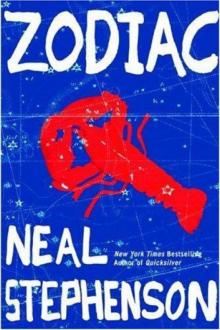 Zodiac: The Eco-Thriller
Zodiac: The Eco-Thriller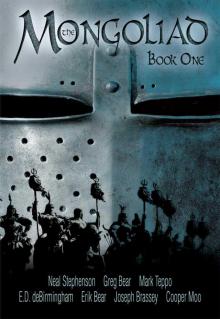 The Mongoliad: Book One
The Mongoliad: Book One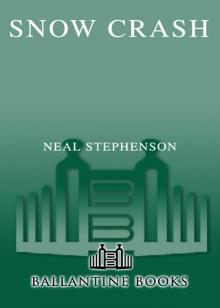 Snow Crash
Snow Crash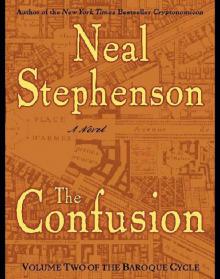 The Confusion: Volume Two of the Baroque Cycle
The Confusion: Volume Two of the Baroque Cycle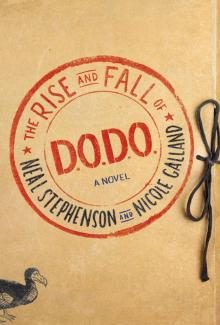 The Rise and Fall of D.O.D.O.
The Rise and Fall of D.O.D.O.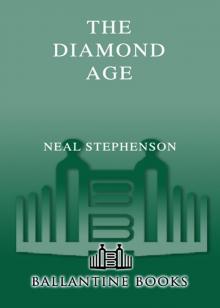 The Diamond Age: Or, a Young Lady's Illustrated Primer
The Diamond Age: Or, a Young Lady's Illustrated Primer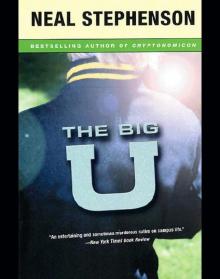 The Big U
The Big U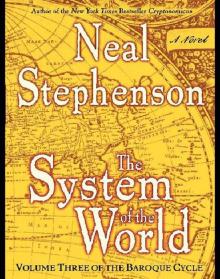 The System of the World: Volume Three of the Baroque Cycle
The System of the World: Volume Three of the Baroque Cycle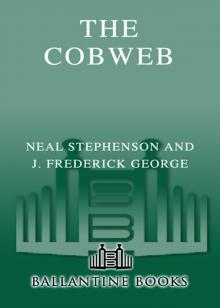 The Cobweb
The Cobweb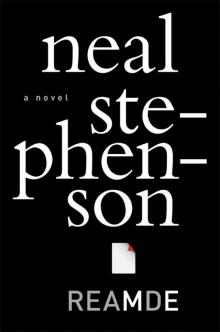 Reamde
Reamde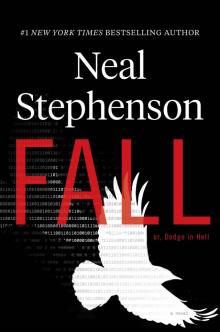 Fall; or, Dodge in Hell
Fall; or, Dodge in Hell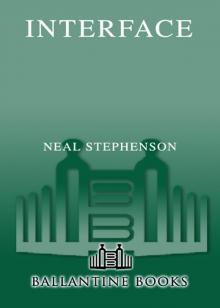 Interface
Interface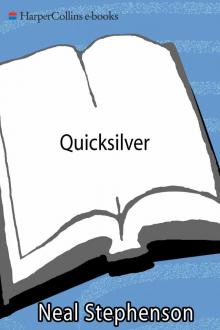 Quicksilver
Quicksilver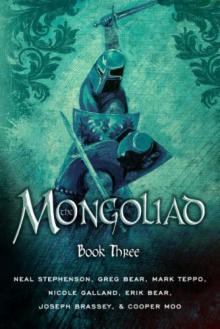 The Mongoliad: Book Three
The Mongoliad: Book Three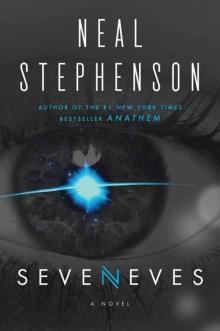 Seveneves
Seveneves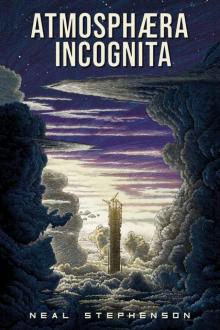 Atmosphæra Incognita
Atmosphæra Incognita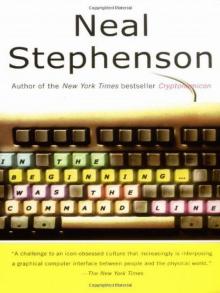 In the Beginning...Was the Command Line
In the Beginning...Was the Command Line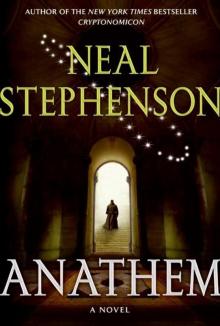 Anathem
Anathem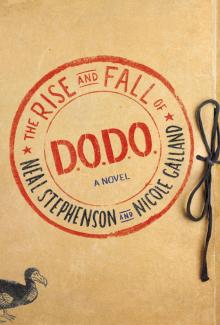 The Rise and Fall of D.O.D.O.: A Novel
The Rise and Fall of D.O.D.O.: A Novel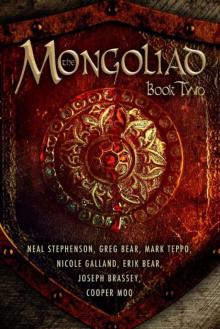 The Mongoliad: Book Two
The Mongoliad: Book Two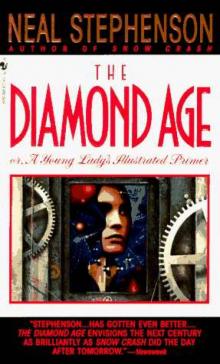 Diamond Age or a Young Lady's Illustrated Primer
Diamond Age or a Young Lady's Illustrated Primer THE System OF THE WORLD
THE System OF THE WORLD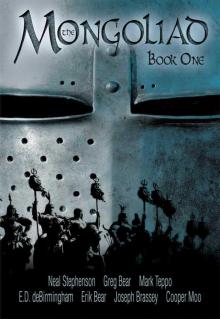 The Mongoliad: Book One tfs-1
The Mongoliad: Book One tfs-1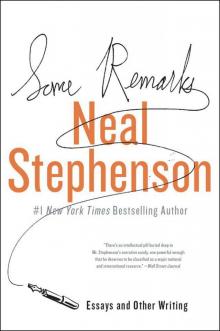 Some Remarks: Essays and Other Writing
Some Remarks: Essays and Other Writing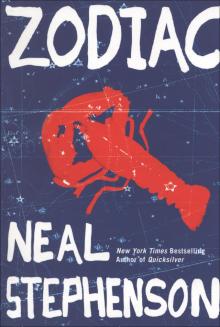 Zodiac
Zodiac Spew
Spew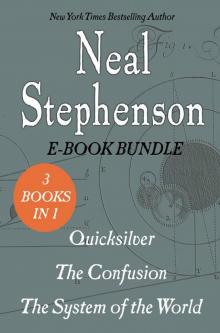 The Baroque Cycle: Quicksilver, the Confusion, and the System of the World
The Baroque Cycle: Quicksilver, the Confusion, and the System of the World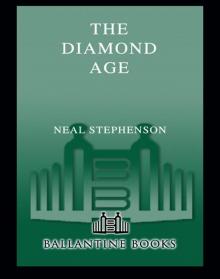 The Diamond Age
The Diamond Age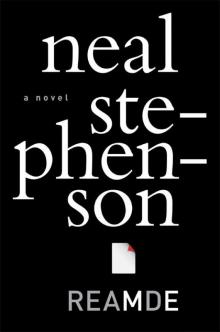 Reamde: A Novel
Reamde: A Novel In the Kingdom of Mao Bell
In the Kingdom of Mao Bell Mother Earth Mother Board
Mother Earth Mother Board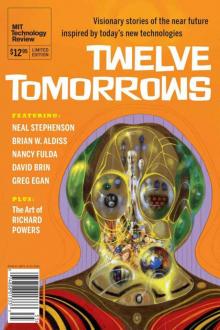 Twelve Tomorrows - Visionary stories of the near future inspired by today's technologies
Twelve Tomorrows - Visionary stories of the near future inspired by today's technologies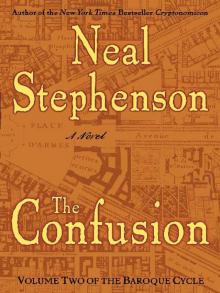 The Confusion
The Confusion The Great Simoleon Caper
The Great Simoleon Caper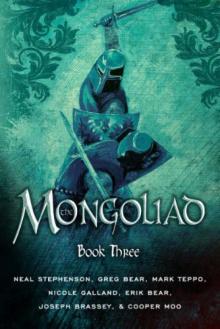 The Mongoliad: Book Three tfs-3
The Mongoliad: Book Three tfs-3